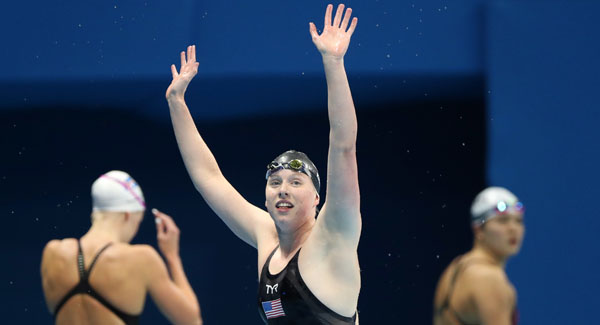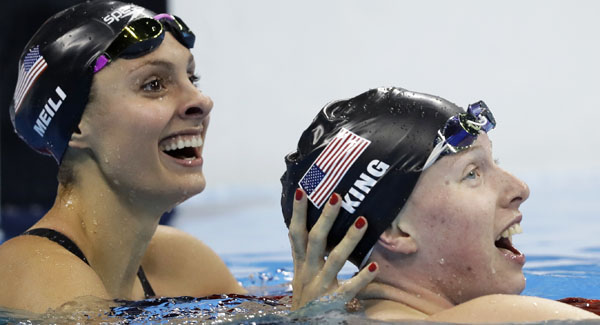American swimmer Lilly King defeated Yulia Efimova in the Rio Games’ most dramatic race so far and then told both her Russian rival and US team-mate Justin Gatlin that neither should be at the Olympics.
The 19-year-old King broke the Olympic record for the 100 metres breaststroke to beat four-time world champion Efimova in a contest that combined Cold War tension with the raw emotion of the ongoing debate about doping.
Efimova, who was loudly booed by the crowd before the race, broke down in tears whilst hugging her agent in front of the world’s swimming media shortly after the race, and struggled to control her emotions throughout a fraught press conference over an hour later.
“Right now I’m really happy after all the stuff that has happened because I’m here racing,” the 24-year-old said. “I did the best I could but I can’t explain my feelings – perhaps you could swap places with me?”
Efimova, who completed a 16-month suspension for doping in early 2015, was only declared eligible for the Games on Saturday, having won an appeal against an International Olympic Committee ban at the Court of Arbitration for Sport two days before.

That ban was imposed a week after the publication of a report into Russia’s state-run doping programme, with Efimova one of several Russians ruled out for their previous convictions.
Her case immediately attracted more attention than any involving her team-mates, as she had only just won an appeal to have a second positive test quashed as it was for the newly-banned drug meldonium, which appears to linger in the body far longer than the World Anti-Doping Agency initially believed.
But regardless of those two successful appeals, Efimova has become a lightning rod for two different forks of anger: Russia’s involvement in Rio and the perception that swimming’s governing body FINA is soft on drugs cheats.
Australia’s 400 metres freestyle champion Mack Horton had already voiced the feelings of many swimmers on Sunday when he accused runner-up Sun Yang of being a drugs cheat and said his win was “one for the good guys”.
King, however, went even further after her victory over Efimova in a remarkable display of straight-talking for one so new to the world stage.
She had already “stirred it up”, in her own words, in the build-up to the race by wagging her finger at the “cheating” Russian and telling reporters she was “not a fan” but what followed in the post-race press conference was both staggering and refreshing in its bluntness.

Asked why she did not congratulate Efimova on her silver medal – the Russian’s best result in her seventh Olympic final – she said she did not think Efimova would have wanted to be congratulated by somebody who had been so critical of her.
“I stand by what I said yesterday but I respect the IOC’s decision and I swam my race, like I planned it, and didn’t let it affect me,” she added.
When it was pointed out to her that sprinter Justin Gatlin had also failed two drugs tests during his career but would be going for gold for the United States on the track, King said she did not agree with that either.
“Do I believe that people who have been caught for doping offences should be on the team? No, they shouldn’t,” she said firmly.
King also said she admired Horton’s stance – “He was only saying what everybody was thinking” – and made a point of saying her gold medal felt incredible because she knew she “did it clean”.
Efimova, meanwhile, looked a broken woman.
The jeers that have greeted her three swims so far have grown and she appears to be getting no support whatsoever from anybody outside the Russian camp, which is ironic for a swimmer who lives and trains in California.
She tried to explain in English how hard the last three weeks had been on her, as well as defending herself against the second positive test for meldonium, but Efimova was clearly unnerved by the intense focus on her, as well as the implacable response she got from both King and America’s Katie Meili, who finished third.
It was telling that when she asked to answer a question in Russian, neither of the Americans put on the headsets to listen to the translation.
And when asked what she knew of Russia’s doping crisis, Efimova probably made her life even worse by suggesting the world was using sport to attack a “strong Russia”.
She swims again later this week in the 200 metres breaststroke and on paper has another strong chance of gold.


